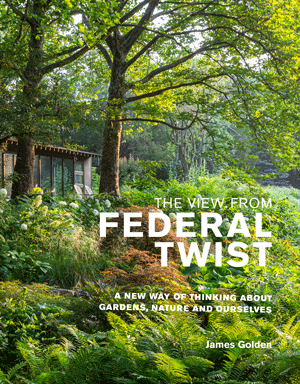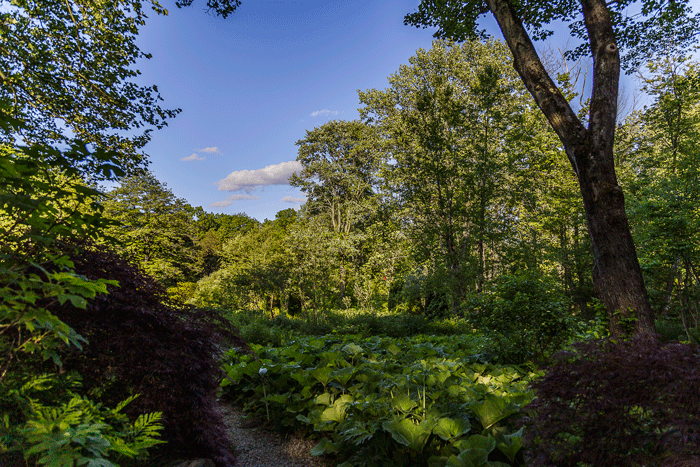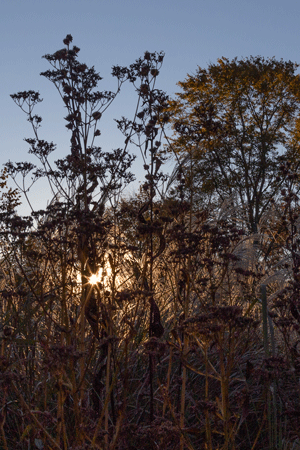Review: The View from Federal Twist
 “We’ve grown so used to seeing gardens as ornament, as places for recreation, as extensions of our homes that we’ve lost touch with other ways of seeing the garden and of being in a garden, indeed, of being. We think of ourselves as the user, the interpreter, the giver of meaning – as the protagonist. But a garden can be protagonist. A garden can act on us, change us.”
“We’ve grown so used to seeing gardens as ornament, as places for recreation, as extensions of our homes that we’ve lost touch with other ways of seeing the garden and of being in a garden, indeed, of being. We think of ourselves as the user, the interpreter, the giver of meaning – as the protagonist. But a garden can be protagonist. A garden can act on us, change us.”
It is perhaps serendipity that James Golden’s ‘The View from Federal Twist – A New Way of Thinking about Gardens, Nature and Ourselves’ should land on my desk at the same time as COP26 is taking place in Glasgow. Here is an important book to provoke and stimulate all of us into asking questions about our relationship with our gardens and landscape and how we use it. Here too, is a book for naturalistic and ecological gardeners and anyone interested in exploring the relationship between gardens, nature and themselves.
 Federal Twist is set in a clearing in the woods in western New Jersey and is a ‘triumph of ecological planting and fearless design‘. Monty Don praises the garden as one of the best he had ever visited anywhere in the world while Noel Kingsbury comments that it is truly a 21st century garden.
Federal Twist is set in a clearing in the woods in western New Jersey and is a ‘triumph of ecological planting and fearless design‘. Monty Don praises the garden as one of the best he had ever visited anywhere in the world while Noel Kingsbury comments that it is truly a 21st century garden.
The book takes us on a story of the making of the garden from its beginnings in a dark, overgrown and derelict wood. Set on a challenging site with heavy clay soil and poorly drained, James discovered the site some 15 years ago when he was nearing retirement. He admits that he came to gardening late in life but then most of us would agree that the moment you discover your “roots” so to speak, doesn’t matter, it’s the fact you find that affinity with the earth and its wonderful produce that’s important.
James can be described as part experimental horticulturist and part philosopher and through the pages of this wonderful book he brings to us how he listened to the site, made a conscious decision not to improve the land and how he planted large, competitive plants into rough grass and watched and waited as sustainable plant communities evolved.
This is a book every gardener should read – you will hopefully identify with the emotional pull of the garden James is describing and be touched by “the spirit of the place” as I was. Here is someone who is working with nature and not against it and at a time when the human race seems hell-bent on destroying the planet that gives us life, it is in many ways somehow reassuring to know that people like James exist. This garden set in a clearing in the woods, is not only environmentally sensitive but also displays fearless design. Its emotional power is what makes it different and as Thomas Rainer says in the Foreword: “….it woke me up“.
In Federal Twist you won’t find a swimming pool, outdoor dining or play areas – by leaving out the normal accoutrements of a garden James has focused attention on its intangible aspects that are universal to all gardens – changing qualities and views, how the garden pushes back against the gardener and how it acquires a distinctive character and sense of place. For James the garden was always going to be naturalistic, merging seamlessly with the surrounding green woods while at the same time preserving the mood of the place.
Over the years, he gradually adds layers of new plantings, seeding and creating new, though minimal, structures, while always seeking to celebrate the emotive power of light and shade, of sound and movement. We are taken through the seasons, the introduction of simple features – liked the idea of his thinking bench – and through his challenges and successes. There is much we can learn from his straightforward approach, his affinity with the landscape and how we can come to appreciate our own gardens less as ornaments but as spaces where we can rethink ‘what a garden can be and do‘, as Monty Don pointed out in his BBC TV series American Gardens on his visit to the garden.
 Indeed, the last chapter in the book is entitled just that, “Rethinking what a garden can be and do” and is, I felt, one of the most important in the book. Our gardens are vital for our wellbeing, for our mental health and our peace of mind. James exhorts us to think less about what a garden can be and more about what it can do. A refuge, a place of respite, a place for laughter and companionship. A garden can certainly change us, bring that sense of calm and peace and in the turmoil of the world today that is certainly something we all strive for.
Indeed, the last chapter in the book is entitled just that, “Rethinking what a garden can be and do” and is, I felt, one of the most important in the book. Our gardens are vital for our wellbeing, for our mental health and our peace of mind. James exhorts us to think less about what a garden can be and more about what it can do. A refuge, a place of respite, a place for laughter and companionship. A garden can certainly change us, bring that sense of calm and peace and in the turmoil of the world today that is certainly something we all strive for.
 The book is lavishly illustrated throughout with images that give us that particular sense of what the author is describing, highlighting that it’s not the gardener who is in charge but the place, the driving force of nature.
The book is lavishly illustrated throughout with images that give us that particular sense of what the author is describing, highlighting that it’s not the gardener who is in charge but the place, the driving force of nature.
James was born in Mississippi, though resident in New York for most of his adult life. He never forgot the happy memories of the plants that fascinated him in childhood. It was when he was nearing retirement and embarking on what he calls ‘la vita nuova’ that he made the decision to follow that long-buried urge towards the natural world, moving to a property in western New Jersey to make a garden. Fifteen years later his garden has become an icon of a naturalistic and sustainable garden. It has featured in many books, television programmes and in his notable blog, View from Federal Twist – a blog you really should follow: https://federaltwist.com
The book has been attracting a lot of attention since publication and as Christmas nears I have no doubt it will top many a present list. Published by Filbert Press, ‘The View from Federal Twist – A new Way of Thinking about Gardens, Nature and Ourselves’ by James Golden, is published in hard back at £40.00.
A review copy of this book was received from the publishers.
All images are ©James Golden/publishers Filbert Press

